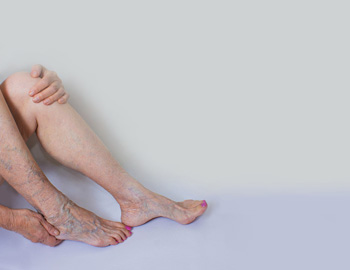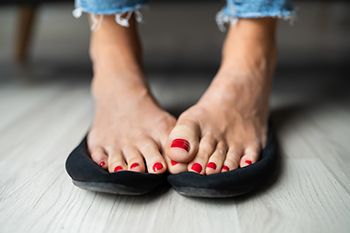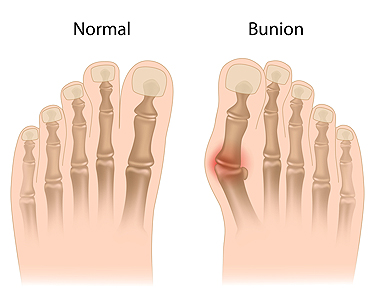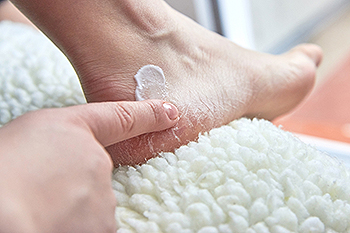Items filtered by date: January 2022
What Causes Varicose Veins?
Varicose veins are visibly raised and swollen blood vessels beneath the surface of the skin. They are frequently seen on the lower legs, where they can be recognized by their blue, purple, or red coloration. Varicose veins are often a cosmetic concern, but they can also become itchy and painful. They are most common in women, older people, and those who are obese. Varicose veins are caused by a malfunction in the one-way valves in the veins that prevent blood from flowing backwards. Weakness or damage to the valves causes blood to pool in the veins. The pooled blood raises the venous pressure and makes the veins swell and twist. If you have varicose veins in your lower legs that are painful, it is suggested that you seek the care of a podiatrist for diagnosis and a treatment plan.
Poor circulation is a serious condition and needs immediate medical attention. If you have any concerns with poor circulation in your feet contact Dr. Ronald Sheppard of Warren-Watchung Podiatry Center. Our doctor will treat your foot and ankle needs.
Poor Circulation in the Feet
Poor blood circulation in the feet and legs is can be caused by peripheral artery disease (PAD), which is the result of a buildup of plaque in the arteries.
Plaque buildup or atherosclerosis results from excess calcium and cholesterol in the bloodstream. This can restrict the amount of blood which can flow through the arteries. Poor blood circulation in the feet and legs are sometimes caused by inflammation in the blood vessels, known as vasculitis.
Causes
Lack of oxygen and oxygen from poor blood circulation restricts muscle growth and development. It can also cause:
- Muscle pain, stiffness, or weakness
- Numbness or cramping in the legs
- Skin discoloration
- Slower nail & hair growth
- Erectile dysfunction
Those who have diabetes or smoke are at greatest risk for poor circulation, as are those who are over 50. If you have poor circulation in the feet and legs it may be caused by PAD and is important to make changes to your lifestyle in order to reduce risk of getting a heart attack or stroke. Exercise and maintaining a healthy lifestyle will dramatically improve conditions.
As always, see a podiatrist as he or she will assist in finding a regimen that suits you. A podiatrist can also prescribe you any needed medication.
If you have any questions please feel free to contact one of our offices located in Marlboro and Watchung, NJ . We offer the newest diagnostic and treatment technologies for all your foot and ankle needs.
Plantar Warts Can Be Treated!
Solutions for Sweaty Feet
Do you regularly soak through your socks and shoes, regardless of the weather? Are you worried about leaving behind wet footprints when you walk around barefoot? Excessively sweaty feet may be a sign of a condition called plantar hyperhidrosis. In addition to being potentially embarrassing, this condition also increases your risk of various foot problems, such as fungal infections and injuries due to your feet slipping as you walk. Fortunately, various treatments are available for plantar hyperhidrosis. These include topical antiperspirants, iontophoresis, and botox injections into the foot. There are also special powders and shoe inserts that you can wear to absorb excess moisture. To learn more about treatments for plantar hyperhidrosis, and to find the right one for you, it’s suggested that you consult with a podiatrist.
If you are suffering from hyperhidrosis contact Dr. Ronald Sheppard of Warren-Watchung Podiatry Center. Our doctor can provide the care you need to attend to all of your foot and ankle needs.
Hyperhidrosis of the Feet
Hyperhidrosis is a rare disorder that can cause people to have excessive sweating of their feet. This can usually occur all on its own without rigorous activity involved. People who suffer from hyperhidrosis may also experience sweaty palms.
Although it is said that sweating is a healthy process meant to cool down the body temperature and to maintain a proper internal temperature, hyperhidrosis may prove to be a huge hindrance on a person’s everyday life.
Plantar hyperhidrosis is considered to be the main form of hyperhidrosis. Secondary hyperhidrosis can refer to sweating that occurs in areas other than the feet or hands and armpits. Often this may be a sign of it being related to another medical condition such as menopause, hyperthyroidism and even Parkinson’s disease.
In order to alleviate this condition, it is important to see your doctor so that they may prescribe the necessary medications so that you can begin to live a normal life again. If this is left untreated, it is said that it will persist throughout an individual’s life.
A last resort approach would be surgery, but it is best to speak with your doctor to find out what may be the best treatment for you.
If you have any questions please feel free to contact one of our offices located in Marlboro and Watchung, NJ . We offer the newest diagnostic and treatment technologies for all your foot and ankle needs.
Are Bunions Genetic?
A bunion is a bony growth that occurs at the base of the big toe joint. Thought to be caused by faulty foot mechanics, bunions are often hereditary, meaning that they run in families. Wearing tight shoes with pointed toes can make bunions more likely to develop. Other than the deformity itself, symptoms of a bunion include pain, soreness, inflammation, redness, or a burning sensation around the bunion. It can become painful to wear certain shoes, walk, or stand for prolonged periods of time. Bunions progressively worsen without treatment, so it is strongly suggested that you see a podiatrist if you have a bunion that is bothering you.
If you are suffering from bunions, contact Dr. Ronald Sheppard of Warren-Watchung Podiatry Center. Our doctor can provide the care you need to keep you pain-free and on your feet.
What Is a Bunion?
A bunion is formed of swollen tissue or an enlargement of boney growth, usually located at the base joint of the toe that connects to the foot. The swelling occurs due to the bones in the big toe shifting inward, which impacts the other toes of the foot. This causes the area around the base of the big toe to become inflamed and painful.
Why Do Bunions Form?
Genetics – Susceptibility to bunions are often hereditary
Stress on the feet – Poorly fitted and uncomfortable footwear that places stress on feet, such as heels, can worsen existing bunions
How Are Bunions Diagnosed?
Doctors often perform two tests – blood tests and x-rays – when trying to diagnose bunions, especially in the early stages of development. Blood tests help determine if the foot pain is being caused by something else, such as arthritis, while x-rays provide a clear picture of your bone structure to your doctor.
How Are Bunions Treated?
- Refrain from wearing heels or similar shoes that cause discomfort
- Select wider shoes that can provide more comfort and reduce pain
- Anti-inflammatory and pain management drugs
- Orthotics or foot inserts
- Surgery
If you have any questions, please feel free to contact one of our offices located in Marlboro and Watchung, NJ . We offer the newest diagnostic and treatment technologies for all your foot care needs.
Ways to Repair Cracked Heels
About one-fifth of adults in the United States experience cracked heels, studies show. Besides being unsightly, cracked heels that deepen can also become painful and lead to bleeding. Because there are no oil glands on the feet, they often become dried out. In addition, medical conditions such as diabetes, psoriasis and eczema can promote cracked heels. One of the simplest remedies for cracked heels is a petroleum jelly treatment. It helps reduce moisture loss from the skin and keeps it hydrated. Soak your feet in warm water for about 15 minutes, and then use a pumice stone to scrub off the dried skin. Rinse and pat dry thoroughly. Next, apply moisture lotion to the affected area and cover that with petroleum jelly to seal it in. Put on a pair of wool socks overnight and wash your feet again the next morning. If cracked heels continue to give you problems, it is suggested that you visit a podiatrist who can recommend further treatment options.
If the skin on your feet starts to crack, you may want to see a podiatrist to find treatment. If you have any concerns, contact Dr. Ronald Sheppard from Warren-Watchung Podiatry Center. Our doctor can provide the care you need to keep you pain-free and on your feet.
Cracked Heels
It is important to moisturize your cracked heels in order to prevent pain, bleeding, and infection. The reason cracked heels form is because the skin on the foot is too dry to support the immense pressure placed on them. When the foot expands, the dry skin on the foot begins to split.
Ways to Help Heal Them
- Invest in a good foot cream
- Try Using Petroleum Jelly
- Ease up on Soaps
- Drink Plenty of Water
Ways to Prevent Cracked Heels
- Moisturize After Showering
- Skip a Shower
- Keep Shower Water Lukewarm
- Don’t Scrub Your Feet
If you are unsure how to proceed in treating cracked heels, seek guidance from a podiatrist. Your doctor will help you with any questions or information you may need.
If you have any questions, please feel free to contact one of our offices located in Marlboro and Watchung, NJ . We offer the newest diagnostic and treatment technologies for all your foot care needs.





